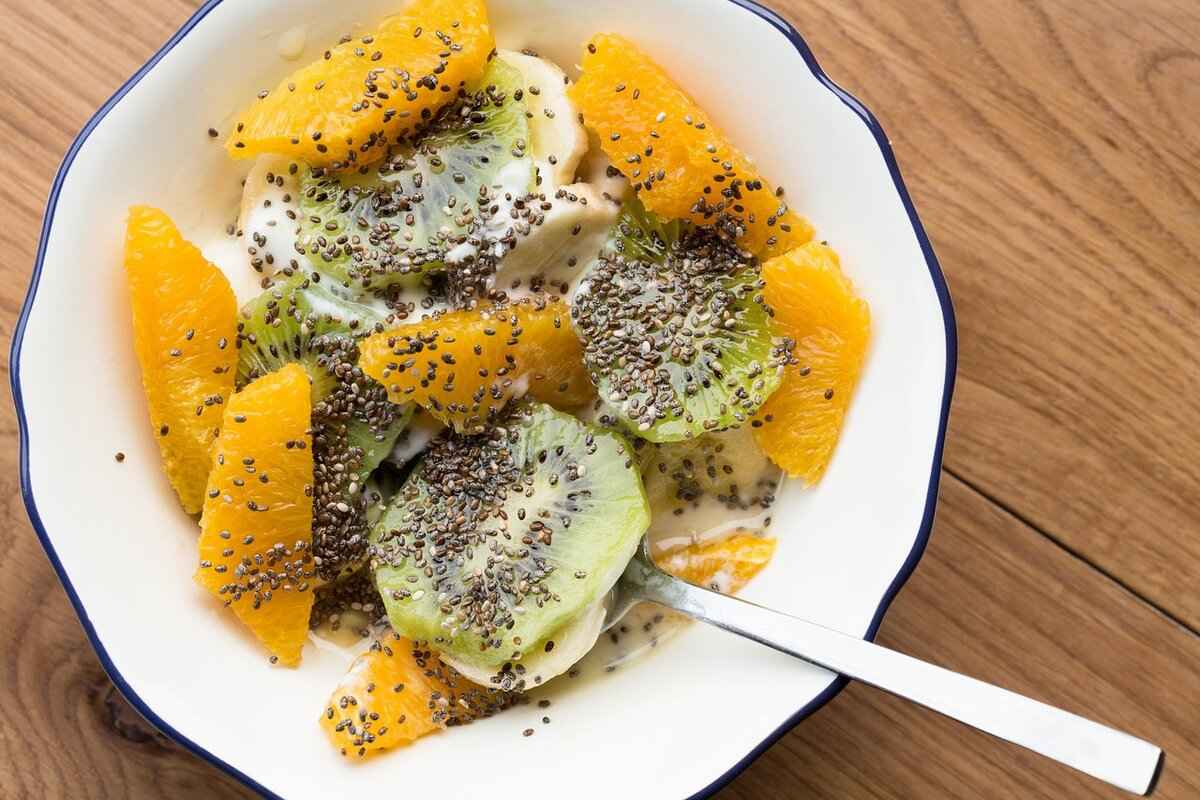This article explores the digestive benefits of chia seeds, their nutritional profile, and how they may influence bowel movements. Discover the facts and insights backed by research to understand their role in digestion.
What Are Chia Seeds?
Chia seeds are tiny, nutrient-packed seeds from the Salvia hispanica plant, native to Central America. These seeds have gained popularity as a superfood due to their impressive nutritional profile, which includes:
- High Fiber Content: Approximately 10 grams of fiber per ounce.
- Omega-3 Fatty Acids: Beneficial for heart health.
- Antioxidants: Help combat oxidative stress.
How Do Chia Seeds Affect Digestion?
Chia seeds can significantly impact digestion, primarily due to their high fiber content. When consumed, they absorb water and can swell up to 10-12 times their original size. This property may help promote regular bowel movements and improve overall gut health.
What Type of Fiber Do Chia Seeds Contain?
Chia seeds are rich in soluble fiber, which forms a gel-like substance in the intestines. This gel aids in nutrient absorption and helps regulate digestion. The soluble fiber in chia seeds can also contribute to a feeling of fullness, which may be beneficial for weight management.
How Soluble Fiber Benefits Gut Health
Soluble fiber is known to support healthy gut bacteria, enhancing digestion and reducing issues like constipation. By incorporating chia seeds into your diet, you may experience more regular bowel movements and improved gut health.
Impact on Bowel Movements
The ability of chia seeds to absorb water and expand in the digestive tract can add bulk to stool. This can alleviate constipation and promote easier passage of waste through the intestines, making chia seeds a valuable addition to a digestive health regimen.
Are There Any Risks of Eating Chia Seeds?
While chia seeds are generally safe for most individuals, consuming them in excessive amounts or without adequate hydration can lead to digestive discomfort, such as bloating or gas. It is essential to drink plenty of water when incorporating chia seeds into your diet to prevent these issues.
How to Incorporate Chia Seeds into Your Diet?
Incorporating chia seeds into your daily meals can be simple and versatile. Here are some practical ways to enjoy them:
- Sprinkle on salads for added crunch.
- Blend into smoothies for a nutrient boost.
- Use in baking recipes like muffins or bread.
Recommended Serving Sizes
A typical serving size for chia seeds is about 1-2 tablespoons. This amount provides sufficient fiber and nutrients without overwhelming your digestive system.
Hydration and Chia Seeds
It’s crucial to consume enough water when eating chia seeds, as they absorb liquid. Adequate hydration ensures that the seeds function effectively in the gut and helps to prevent any potential digestive issues.
Do Chia Seeds Have Any Other Health Benefits?
Beyond aiding digestion, chia seeds offer numerous health benefits, including:
- Heart Health: Rich in omega-3 fatty acids, which can reduce inflammation and lower cholesterol levels.
- Weight Management: The high fiber content promotes satiety, helping to control appetite.
- Blood Sugar Control: May help stabilize blood sugar levels, beneficial for those with diabetes.
What Do Experts Say About Chia Seeds and Digestion?
Nutritionists and health experts often endorse chia seeds for their digestive benefits. They emphasize the importance of moderation and hydration to maximize the positive effects on bowel health.
Expert Recommendations for Consumption
Health professionals recommend gradually introducing chia seeds into your diet. This approach allows your digestive system to adjust, ensuring optimal benefits without discomfort.
Research Findings on Chia Seeds
Studies have shown that incorporating chia seeds into the diet can improve digestive health markers, highlighting their potential role in enhancing bowel regularity and overall gut function.

What Are Chia Seeds?
Chia seeds, derived from the Salvia hispanica plant, are tiny but mighty seeds that have gained immense popularity in the health and wellness community. These seeds, native to Mexico and Guatemala, are celebrated for their impressive nutritional profile and numerous health benefits. Packed with fiber, omega-3 fatty acids, and a variety of antioxidants, chia seeds have earned their status as a superfood among health enthusiasts.
Chia seeds are a powerhouse of nutrition. A typical serving size of just two tablespoons contains:
- 11 grams of fiber – essential for digestive health.
- 5 grams of protein – important for muscle maintenance and repair.
- Omega-3 fatty acids – known for their anti-inflammatory properties and heart health benefits.
- Calcium, magnesium, and phosphorus – vital for bone health.
- A variety of antioxidants that help combat oxidative stress.
The high fiber content in chia seeds plays a crucial role in promoting digestive health. When consumed, chia seeds can absorb up to 10-12 times their weight in water, forming a gel-like substance. This characteristic can:
- Facilitate regular bowel movements by adding bulk to the stool.
- Enhance nutrient absorption in the intestines.
- Promote a feeling of fullness, which can aid in weight management.
Chia seeds are primarily composed of soluble fiber, which has unique properties beneficial for gut health. This type of fiber forms a gel-like consistency in the digestive tract, helping to:
- Regulate blood sugar levels by slowing down the absorption of sugar.
- Support healthy gut bacteria, which is essential for optimal digestion.
- Reduce constipation by softening the stool.
While chia seeds are generally safe for most individuals, moderation is key. Consuming large quantities without sufficient water can lead to digestive discomfort, such as:
- Bloating
- Gas
- Abdominal pain
To avoid these issues, it is advisable to start with a small amount and gradually increase your intake.
Integrating chia seeds into your meals is easy and versatile. Here are some practical ways to enjoy their benefits:
- Add them to smoothies for a nutrient boost.
- Sprinkle them on salads or yogurt.
- Use them in baking recipes, such as breads or muffins.
- Mix them into oatmeal or overnight oats.
Nutritionists and health experts often highlight the importance of chia seeds in a balanced diet. They recommend:
- Gradually introducing chia seeds to allow your digestive system to adapt.
- Ensuring adequate hydration when consuming chia seeds.
Research has shown that incorporating chia seeds into your diet can enhance digestive health and promote regularity.

How Do Chia Seeds Affect Digestion?
Chia seeds, derived from the Salvia hispanica plant, are increasingly recognized for their significant impact on digestive health. These tiny seeds are packed with nutrients, particularly fiber, which plays a crucial role in maintaining a healthy digestive system. When consumed, chia seeds can absorb water and expand, creating a gel-like substance that aids in promoting regular bowel movements and overall gut health.
What Makes Chia Seeds a Fiber Powerhouse?
Chia seeds are primarily composed of soluble fiber, which is essential for digestive health. This type of fiber dissolves in water and forms a viscous gel in the intestines. This gel not only helps to regulate digestion but also enhances the absorption of nutrients. By providing a feeling of fullness, chia seeds can assist in controlling appetite, making them a popular choice for those looking to manage their weight.
How Do Chia Seeds Promote Regular Bowel Movements?
The expansion of chia seeds in the digestive tract adds bulk to the stool, which can alleviate constipation and promote easier passage of waste. This bulk-forming property is particularly beneficial for individuals who may struggle with irregular bowel movements. By incorporating chia seeds into your diet, you can help ensure that your digestive system functions smoothly.
What Are the Benefits of Soluble Fiber for Gut Health?
- Supports healthy gut bacteria, which is essential for optimal digestion.
- Helps to reduce digestive issues such as bloating and gas.
- Enhances nutrient absorption, contributing to overall health.
Are There Any Risks Associated with Chia Seeds?
While chia seeds are generally safe for most people, it is important to consume them in moderation. Eating excessive amounts without adequate hydration can lead to digestive discomfort, including bloating or gas. Therefore, it is advisable to gradually introduce chia seeds into your diet and ensure you drink plenty of water.
How Can You Incorporate Chia Seeds into Your Diet?
Incorporating chia seeds into your daily meals can be simple and versatile. Here are some practical ways to enjoy them:
- Sprinkle chia seeds on salads for added crunch and nutrition.
- Blend them into smoothies for a nutrient boost.
- Use them in baking recipes to enhance flavor and fiber content.
What Is the Recommended Serving Size for Chia Seeds?
A typical serving size for chia seeds is about 1-2 tablespoons. This amount provides sufficient fiber and nutrients without overwhelming your digestive system. It is essential to monitor your body’s response and adjust your intake accordingly.
How Does Hydration Affect Chia Seeds?
Chia seeds can absorb up to 12 times their weight in water. Therefore, adequate hydration is crucial when consuming chia seeds. Drinking enough water helps prevent potential digestive issues and ensures that the seeds can function effectively in the gut.
What Do Nutrition Experts Say About Chia Seeds?
Nutritionists often endorse chia seeds for their digestive benefits, emphasizing the importance of moderation and hydration. They recommend gradually introducing chia seeds into your diet to allow your digestive system to adjust, maximizing their positive effects on bowel health.
What Does Research Indicate About Chia Seeds and Digestion?
Studies have shown that incorporating chia seeds into the diet can improve digestive health markers. These findings highlight their potential role in enhancing bowel regularity and overall gut function, making them a valuable addition to a balanced diet.
What Type of Fiber Do Chia Seeds Contain?
Chia seeds are often hailed as a superfood due to their impressive nutritional profile, particularly their high fiber content. These tiny seeds, derived from the Salvia hispanica plant, are predominantly composed of soluble fiber, which plays a crucial role in digestive health. But what exactly does this mean for your body?
When chia seeds are consumed, they absorb water and swell, forming a gel-like substance. This process is primarily due to their soluble fiber content, which can significantly impact digestion in several ways:
- Regulation of Digestion: The gel-like consistency created by chia seeds can help regulate digestion by slowing down the digestive process. This allows for better nutrient absorption in the intestines.
- Feeling of Fullness: The expansion of chia seeds in the stomach can promote a feeling of fullness, which may help control appetite and reduce overall caloric intake.
- Improved Bowel Movements: The bulk created by chia seeds can help facilitate regular bowel movements, reducing the likelihood of constipation.
The soluble fiber in chia seeds also acts as a prebiotic, nourishing the beneficial bacteria in your gut. This is essential for maintaining a healthy gut microbiome, which is linked to various aspects of overall health, including immune function and mental well-being.
Research has shown that diets high in soluble fiber can lead to improved digestive health. A study published in the Journal of Nutrition found that individuals who incorporated soluble fiber into their diets experienced significant improvements in bowel regularity. This highlights the potential of chia seeds as a natural solution for digestive issues.
However, it is important to consume chia seeds with adequate hydration. Since they absorb a significant amount of water, failing to drink enough fluids can lead to digestive discomfort, such as bloating or gas. It is recommended to drink at least 8 ounces of water for every tablespoon of chia seeds consumed.
To effectively incorporate chia seeds into your diet, consider adding them to smoothies, yogurt, or oatmeal. They can also be used as a thickening agent in soups and sauces or sprinkled on salads for an extra crunch. A typical serving size is about 1-2 tablespoons, providing an ample amount of fiber without overwhelming the digestive system.
In summary, the soluble fiber found in chia seeds offers numerous benefits for digestion. By promoting regular bowel movements, enhancing nutrient absorption, and supporting gut health, chia seeds can be a valuable addition to a balanced diet. Remember to stay hydrated and enjoy these seeds in moderation to maximize their health benefits.
How Soluble Fiber Benefits Gut Health
Soluble fiber plays a crucial role in maintaining a healthy digestive system. Found in various foods including chia seeds, oats, and fruits, soluble fiber is known for its ability to absorb water and form a gel-like substance in the intestines. This characteristic not only aids in digestion but also has several other beneficial effects on gut health.
Enhancing Gut Bacteria
One of the primary benefits of soluble fiber is its ability to support the growth of healthy gut bacteria. These beneficial microorganisms are essential for various digestive processes and overall health. A diet rich in soluble fiber can promote a diverse microbiome, which is linked to improved digestion and a stronger immune system. Studies have shown that a balanced gut microbiome can help reduce inflammation and protect against gastrointestinal disorders.
Improving Digestion and Reducing Constipation
Including soluble fiber in your diet can significantly improve digestion by promoting regular bowel movements. When chia seeds are consumed, they swell and absorb water, which can help to bulk up stool. This process not only facilitates easier passage of waste through the intestines but also reduces the likelihood of constipation. For individuals who struggle with irregular bowel movements, incorporating chia seeds may lead to noticeable improvements.
Promoting Satiety and Weight Management
Another advantage of soluble fiber is its ability to promote a feeling of fullness. When soluble fiber forms a gel-like consistency, it slows down the digestion process, leading to prolonged satiety. This can be particularly beneficial for those looking to manage their weight, as it helps control appetite and reduces the likelihood of overeating. By integrating chia seeds into meals, individuals can enjoy both the digestive benefits and the weight management support that soluble fiber offers.
Regulating Blood Sugar Levels
Soluble fiber also plays a role in regulating blood sugar levels. By slowing the absorption of sugar into the bloodstream, it helps prevent spikes in blood glucose levels. This is particularly advantageous for individuals with diabetes or those at risk of developing the condition. Chia seeds, being rich in soluble fiber, can be a valuable addition to a balanced diet aimed at maintaining stable blood sugar levels.
Hydration and Fiber Intake
It’s crucial to note that when consuming soluble fiber, particularly from sources like chia seeds, adequate hydration is essential. As these seeds absorb a significant amount of liquid, drinking enough water can help prevent potential digestive discomfort such as bloating or gas. Experts recommend drinking plenty of fluids throughout the day, especially when increasing fiber intake.
Potential Risks of Excessive Fiber
- While soluble fiber is beneficial, excessive consumption without adequate hydration can lead to digestive issues.
- Signs of too much fiber can include bloating, gas, and abdominal discomfort.
- It’s advisable to gradually increase fiber intake to allow the digestive system to adjust.
Conclusion
Incorporating soluble fiber, particularly from sources like chia seeds, can significantly enhance gut health. From supporting healthy gut bacteria to improving digestion and regulating blood sugar levels, the benefits are numerous. By understanding the importance of hydration and moderation, individuals can effectively harness the power of soluble fiber to promote overall digestive wellness.
Impact on Bowel Movements
When it comes to promoting digestive health, chia seeds have gained significant attention due to their unique properties. These tiny seeds, when consumed, can dramatically affect bowel movements and overall gut function.
Chia seeds are derived from the Salvia hispanica plant and are celebrated for their impressive nutritional profile. They are packed with fiber, omega-3 fatty acids, and essential minerals, making them a valuable addition to any diet. One of the most notable features of chia seeds is their ability to absorb water and expand in the digestive tract.
The expansion of chia seeds in the digestive tract can significantly enhance stool bulk. This increased bulk is crucial for alleviating constipation and promoting smoother passage of waste through the intestines. As chia seeds absorb water, they form a gel-like substance that can help regulate bowel movements.
- High Fiber Content: Chia seeds contain both soluble and insoluble fiber, which play different roles in digestion. Soluble fiber helps to create a gel-like consistency, while insoluble fiber adds bulk to the stool.
- Hydration: When chia seeds absorb water, they swell, which can help soften the stool and make it easier to pass.
- Gut Health: A healthy gut microbiome is essential for regular bowel movements. Chia seeds can promote the growth of beneficial gut bacteria, enhancing digestion.
To reap the digestive benefits of chia seeds, consider the following methods:
- Add to Smoothies: Blend chia seeds into your favorite smoothies for a nutritious boost.
- Sprinkle on Salads: Use chia seeds as a topping for salads to enhance fiber intake.
- Mix with Yogurt: Combine chia seeds with yogurt for a delicious and gut-friendly snack.
A typical serving of chia seeds is about 1-2 tablespoons. This amount is generally sufficient to provide the necessary fiber and nutrients without overwhelming the digestive system.
It is crucial to drink plenty of water when consuming chia seeds. As they absorb liquid, adequate hydration helps prevent potential digestive discomfort, such as bloating or gas. Aim to drink at least 8 ounces of water for every tablespoon of chia seeds consumed.
While chia seeds are generally safe, overconsumption can lead to digestive issues. It’s important to introduce them gradually into your diet to allow your digestive system to adjust.
Nutritionists often recommend chia seeds for their digestive benefits, emphasizing the importance of moderation and hydration. Research supports the idea that incorporating chia seeds into your diet can lead to improved bowel regularity and overall gut health.
Studies have indicated that individuals who include chia seeds in their diet experience better digestive health markers. Their ability to enhance bowel regularity and support gut function is well-documented, making them a valuable superfood for those seeking to improve their digestive health.
Are There Any Risks of Eating Chia Seeds?
Chia seeds have gained immense popularity as a superfood, celebrated for their numerous health benefits. However, like any food, they come with certain risks, especially when consumed improperly. Understanding these risks is essential for anyone looking to incorporate chia seeds into their diet.
While chia seeds are generally safe for most individuals, consuming them in excessive amounts or without adequate hydration can lead to digestive discomfort. This discomfort may manifest as:
- Bloating: The seeds can absorb up to 12 times their weight in water, leading to an expansion in the stomach and potential bloating.
- Gas: Increased fiber intake from chia seeds can lead to gas production as gut bacteria ferment the fiber.
- Constipation: Without sufficient hydration, the gel-like consistency formed by chia seeds can harden in the digestive tract, leading to constipation.
Though rare, some individuals may experience allergic reactions to chia seeds. Symptoms can include:
- Skin rashes
- Itching
- Swelling of the face, lips, or throat
If you suspect an allergy, it is crucial to consult with a healthcare professional before consuming chia seeds.
Chia seeds may interact with certain medications, particularly those that affect blood sugar and blood pressure. The high fiber content can influence the absorption of these medications, potentially altering their effectiveness. Individuals taking:
- Anticoagulants: Chia seeds can have a blood-thinning effect, which may enhance the effects of blood-thinning medications.
- Diabetes medications: The seeds can lower blood sugar levels, which may lead to hypoglycemia if taken with diabetes medications.
Always consult with a healthcare provider to ensure that chia seeds can be safely included in your diet alongside any medications.
To enjoy the benefits of chia seeds while minimizing risks, it is advisable to adhere to recommended serving sizes. A typical serving is about 1-2 tablespoons per day. This amount provides a healthy dose of nutrients and fiber without overwhelming the digestive system.
One of the most critical aspects of consuming chia seeds is hydration. Since these seeds absorb a significant amount of water, it is essential to drink plenty of fluids when incorporating them into your diet. This practice helps prevent any potential digestive issues and ensures that the seeds can function effectively in the gut.
For those new to chia seeds, it is wise to introduce them gradually into your diet. Start with small amounts and increase as your body adjusts. This approach allows your digestive system to adapt to the increased fiber intake, reducing the likelihood of discomfort.
Before making any significant dietary changes, particularly if you have existing health conditions or concerns, it is advisable to consult with a healthcare professional. They can provide personalized advice and help you understand how chia seeds may fit into your overall health plan.
In summary, while chia seeds offer numerous health benefits, it is essential to be aware of the potential risks associated with their consumption. By understanding these risks and taking appropriate precautions, you can safely enjoy the nutritional advantages that chia seeds have to offer.

How to Incorporate Chia Seeds into Your Diet?
Incorporating chia seeds into your diet can be both easy and enjoyable. These tiny seeds are not only nutritious but also incredibly versatile, allowing for a range of culinary applications. Whether you’re looking to enhance your meals with added health benefits or simply want to try something new, chia seeds can be a fantastic addition to your daily routine.
- Sprinkling on Salads: One of the simplest ways to enjoy chia seeds is by sprinkling them on top of your favorite salads. They add a delightful crunch and a nutritional boost.
- Blending into Smoothies: Chia seeds can be easily blended into smoothies for added texture and nutrition. They absorb liquid and can help thicken your drink, making it more satisfying.
- Incorporating into Baking: Use chia seeds in your baking recipes. They can be added to muffins, bread, or pancakes, enhancing both the flavor and health benefits of your baked goods.
- Making Chia Pudding: Combine chia seeds with your choice of milk or yogurt and let them soak overnight. This creates a delicious and nutritious pudding that can be topped with fruits, nuts, or honey.
- Adding to Yogurt or Oatmeal: Mix chia seeds into your morning yogurt or oatmeal for an extra boost of fiber and omega-3 fatty acids.
A typical serving size for chia seeds is about 1-2 tablespoons. This amount is generally sufficient to reap the nutritional benefits without overwhelming your digestive system. It’s important to start with a smaller amount and gradually increase your intake to allow your body to adjust.
Chia seeds have the unique ability to absorb liquid—up to 12 times their weight. Therefore, it is crucial to consume enough water when adding them to your diet. Adequate hydration not only helps prevent digestive discomfort but also ensures that the seeds can function effectively in your gut, promoting better digestion and nutrient absorption.
Absolutely! Chia seeds are not limited to sweet dishes. They can be incorporated into various savory recipes. For example, you can add them to soups or stews for a nutrient boost. They can also be used as a thickening agent in sauces or dressings, enhancing both flavor and health benefits.
In addition to their versatility, chia seeds offer numerous health benefits. They are rich in fiber, which aids in digestion and promotes a feeling of fullness. The omega-3 fatty acids found in chia seeds are beneficial for heart health, while their high antioxidant content helps combat oxidative stress in the body. By incorporating chia seeds into your meals, you can support overall health and well-being.
To maintain their freshness and nutritional value, store chia seeds in a cool, dry place, preferably in an airtight container. They can also be refrigerated to extend their shelf life. Proper storage ensures that you always have these nutritious seeds on hand for your culinary adventures.
In summary, adding chia seeds to your diet can be a simple and rewarding way to enhance your meals. With their numerous health benefits and versatility in cooking, there’s no reason not to include them in your daily routine. So, get creative and start experimenting with different ways to enjoy chia seeds today!
Recommended Serving Sizes
When it comes to incorporating chia seeds into your diet, understanding the appropriate serving size is crucial for maximizing their health benefits while minimizing any potential digestive discomfort. A typical serving size for chia seeds is about 1-2 tablespoons. This amount can provide sufficient fiber and nutrients without overwhelming the digestive system.
Serving size matters because it directly impacts how your body processes nutrients. Consuming chia seeds in moderation allows your digestive system to function optimally. If you exceed the recommended serving size, you may experience digestive discomfort, such as bloating or gas, especially if you haven’t adjusted your water intake accordingly.
Chia seeds are packed with essential nutrients. In just one tablespoon (about 15 grams), you can find:
- Fiber: Approximately 5 grams
- Omega-3 Fatty Acids: 2,400 mg
- Protein: 2 grams
- Calcium: 76 mg
- Magnesium: 40 mg
This nutrient density makes chia seeds a fantastic addition to your diet, but moderation is key to reaping the benefits without adverse effects.
There are numerous ways to enjoy chia seeds while adhering to the recommended serving size:
- Breakfast: Add 1 tablespoon of chia seeds to your morning smoothie or oatmeal.
- Snacks: Mix chia seeds into yogurt or sprinkle them on top of fruit.
- Baking: Incorporate them into muffins or bread for added nutrition.
- Salads: Sprinkle chia seeds on salads for an extra crunch.
Chia seeds can absorb up to 12 times their weight in water, forming a gel-like consistency. This characteristic is beneficial for digestion, but it also underscores the importance of hydration. It is essential to drink plenty of water when consuming chia seeds to prevent any potential digestive issues.
While 1-2 tablespoons is the general recommendation, it’s important to listen to your body. Some individuals may find that starting with a smaller amount, such as 1 teaspoon, and gradually increasing it allows for better tolerance. This gradual introduction can help your digestive system adapt to the increased fiber intake.
Although chia seeds are generally safe for most people, consuming them in excess can lead to digestive discomfort. Symptoms may include:
- Bloating
- Gas
- Stomach cramps
To mitigate these risks, it’s crucial to adhere to the recommended serving sizes and maintain adequate hydration.
In conclusion, incorporating chia seeds into your diet can provide numerous health benefits, particularly for digestion, but moderation is key. A typical serving size of 1-2 tablespoons is a great starting point. By paying attention to your body’s responses and staying hydrated, you can enjoy the nutritional advantages of chia seeds without any unwanted side effects.
Hydration and Chia Seeds
When it comes to incorporating chia seeds into your diet, understanding the importance of hydration is essential. These tiny seeds, known for their impressive health benefits, can absorb up to 12 times their weight in water. This unique property makes it imperative to drink enough fluids when consuming chia seeds, as insufficient hydration may lead to digestive discomfort.
Chia seeds are often celebrated for their high fiber content, which is beneficial for digestive health. However, when they absorb liquid, they swell and form a gel-like consistency. This process can aid in creating a feeling of fullness, which is great for weight management, but it also means that if you consume them without adequate water, they can potentially cause issues.
- Preventing Digestive Issues: The gel formation is crucial for proper digestion. If chia seeds are not adequately hydrated, they can expand in the digestive tract, leading to symptoms such as bloating and discomfort.
- Optimal Functionality: For chia seeds to function effectively in the gut, they must be hydrated. This ensures that they can help move waste through the intestines smoothly, promoting regular bowel movements.
Experts recommend drinking at least 8 ounces of water for every tablespoon of chia seeds consumed. This not only helps the seeds to expand properly but also supports overall hydration levels in the body. Staying hydrated is particularly important for those who lead an active lifestyle or live in hot climates, as they may require additional fluids.
Incorporating chia seeds into your meals can be a delightful experience. You can add them to smoothies, puddings, or even sprinkle them on salads. However, always remember to pair them with sufficient liquid. For instance, if you’re making a chia pudding, let the seeds soak in almond milk or another liquid of choice for several hours or overnight. This allows the seeds to absorb the liquid and reach their full potential, enhancing both texture and nutritional benefits.
Moreover, it’s important to listen to your body. If you are new to chia seeds, start with a smaller amount and gradually increase your intake while ensuring you maintain proper hydration. This approach allows your digestive system to adjust and minimizes the risk of discomfort.
In conclusion, while chia seeds are a fantastic addition to a healthy diet, their benefits can only be fully realized with adequate hydration. By ensuring you drink enough water, you can enjoy the digestive benefits of these nutrient-dense seeds without the risk of adverse effects. So, next time you reach for chia seeds, remember the golden rule: hydrate for health!

Do Chia Seeds Have Any Other Health Benefits?
Chia seeds, often celebrated for their digestive advantages, extend their benefits far beyond just aiding digestion. These tiny seeds are a powerhouse of nutrition and provide a variety of health benefits that can contribute to overall wellness. In this section, we will explore the multifaceted advantages of incorporating chia seeds into your diet.
One of the most significant benefits of chia seeds is their contribution to heart health. Rich in omega-3 fatty acids, particularly alpha-linolenic acid (ALA), chia seeds can help reduce inflammation and lower cholesterol levels. Regular consumption of these seeds may lead to improved cardiovascular health by:
- Reducing blood pressure: Studies indicate that omega-3 fatty acids can help lower blood pressure, reducing the risk of heart disease.
- Improving cholesterol levels: Chia seeds may help increase HDL (good) cholesterol and decrease LDL (bad) cholesterol.
Chia seeds can also play a vital role in weight management. Their high fiber content promotes a feeling of fullness, which can help control appetite and reduce overall calorie intake. Here are some ways chia seeds contribute to weight management:
- Satiety: The soluble fiber in chia seeds absorbs water and expands in the stomach, helping you feel fuller for longer.
- Low-calorie addition: They can be easily incorporated into meals without adding significant calories, making them an excellent choice for those looking to lose weight.
For individuals concerned about blood sugar control, chia seeds may offer a natural solution. Their unique combination of fiber, protein, and healthy fats can help stabilize blood sugar levels. Here’s how:
- Slow digestion: The gel-like substance formed by chia seeds when mixed with water slows down digestion, leading to a gradual release of sugar into the bloodstream.
- Improved insulin sensitivity: Some studies suggest that chia seeds may enhance insulin sensitivity, which is crucial for maintaining healthy blood sugar levels.
Chia seeds are also an excellent source of several nutrients that are essential for bone health, including calcium, phosphorus, and magnesium. These minerals play a critical role in maintaining bone density and strength. Regular consumption of chia seeds can contribute to:
- Stronger bones: The calcium content in chia seeds is particularly beneficial for those who are lactose intolerant or do not consume dairy.
- Reduced risk of osteoporosis: Adequate intake of these minerals can help lower the risk of bone-related diseases.
Chia seeds are rich in antioxidants, which help combat oxidative stress and reduce inflammation in the body. The antioxidants in chia seeds can help protect against chronic diseases and promote overall health. Some benefits include:
- Cell protection: Antioxidants protect cells from damage caused by free radicals, potentially lowering the risk of cancer and other diseases.
- Enhanced immune function: A diet rich in antioxidants can boost the immune system, keeping you healthier overall.
Incorporating chia seeds into your diet not only enhances your digestive health but also provides a myriad of other health benefits, making them a valuable addition to a balanced diet. Whether you sprinkle them on your morning oatmeal or blend them into a smoothie, the health advantages of chia seeds are undeniable.
Chia Seeds and Weight Management
Chia seeds have gained immense popularity as a superfood, particularly for their role in weight management. These tiny seeds are packed with essential nutrients and are known for their high fiber content, which can play a significant role in controlling appetite and promoting satiety. In this section, we will explore how chia seeds can aid in weight loss and the mechanisms behind their effectiveness.
The effectiveness of chia seeds in weight management can be attributed to their unique nutritional profile. With approximately 10 grams of fiber per ounce, chia seeds are an excellent source of dietary fiber. When consumed, they absorb water and swell in the stomach, forming a gel-like substance. This not only increases the volume of food in the stomach but also slows down digestion, leading to a prolonged feeling of fullness.
- High Fiber Content: The soluble fiber in chia seeds helps regulate digestion and creates a feeling of fullness, which can reduce overall calorie intake.
- Water Absorption: When chia seeds absorb water, they expand significantly, which can help curb hunger pangs and prevent overeating.
- Balanced Blood Sugar Levels: The fiber in chia seeds helps to stabilize blood sugar levels, preventing spikes that can lead to cravings and unhealthy snacking.
Incorporating chia seeds into your daily diet can be simple and versatile. Here are some practical ways:
- Add chia seeds to your smoothies for a nutritious boost.
- Sprinkle them on salads or yogurt for added texture and fiber.
- Use them in baking recipes as a healthy substitute for eggs.
To reap the benefits of chia seeds without overwhelming your digestive system, it is recommended to start with a serving size of about 1-2 tablespoons per day. This amount provides ample fiber and nutrients, aiding in weight management while ensuring comfort.
When consuming chia seeds, it is crucial to maintain proper hydration. Since these seeds can absorb up to 12 times their weight in water, drinking adequate fluids helps prevent potential digestive discomfort, such as bloating or gas. Pairing chia seeds with sufficient water intake ensures they function effectively in the digestive tract.
Research indicates that incorporating chia seeds into a balanced diet can support long-term weight loss efforts. Their ability to promote satiety can lead to reduced calorie intake over time. However, it’s essential to combine chia seeds with a healthy lifestyle, including regular physical activity and a balanced diet rich in whole foods.
Nutritionists often endorse chia seeds as part of a weight management strategy. They emphasize the importance of moderation and hydration, suggesting that individuals gradually introduce chia seeds into their diets to allow their bodies to adapt. This approach maximizes the benefits while minimizing potential digestive issues.
Studies have shown that incorporating chia seeds into the diet can lead to improvements in weight management markers. These findings highlight the potential of chia seeds to enhance satiety and support overall digestive health, making them a valuable addition to a weight loss regimen.
In conclusion, chia seeds offer a myriad of benefits for those looking to manage their weight effectively. Their high fiber content, ability to promote fullness, and ease of incorporation into various meals make them an excellent choice for anyone aiming to achieve a healthier lifestyle.
Chia Seeds and Heart Health
Chia seeds are often celebrated for their numerous health benefits, particularly their positive impact on heart health. These tiny seeds, derived from the Salvia hispanica plant, are packed with essential nutrients that contribute to overall cardiovascular wellness.
One of the standout features of chia seeds is their high content of omega-3 fatty acids. These healthy fats are known for their ability to reduce inflammation in the body, which is a critical factor in preventing heart disease. By incorporating chia seeds into your diet, you may significantly lower your risk of developing cardiovascular issues.
Omega-3 fatty acids, particularly alpha-linolenic acid (ALA) found in chia seeds, play a vital role in maintaining heart health. They can help:
- Reduce triglyceride levels: High triglycerides are a risk factor for heart disease. Regular consumption of chia seeds can help keep these levels in check.
- Lower blood pressure: Studies suggest that omega-3s can help reduce blood pressure in individuals with hypertension.
- Improve cholesterol levels: Chia seeds can help raise HDL (good) cholesterol while lowering LDL (bad) cholesterol, promoting a healthier lipid profile.
Chronic inflammation is linked to numerous health problems, including heart disease. The anti-inflammatory properties of chia seeds can help combat this issue. By reducing inflammation, chia seeds can protect the arteries from damage, enhancing overall cardiovascular health.
Incorporating chia seeds into your daily routine is easy and versatile. Here are some practical ways to enjoy them:
- Add to smoothies: Blend chia seeds into your favorite smoothie for a nutrient boost.
- Sprinkle on salads: Use chia seeds as a topping for salads to enhance texture and nutrition.
- Mix into oatmeal or yogurt: Stir chia seeds into your breakfast for added fiber and omega-3s.
Nutritionists and health experts often recommend chia seeds as part of a heart-healthy diet. They emphasize the importance of including a variety of nutrient-rich foods and maintaining a balanced diet. According to research, a diet rich in omega-3 fatty acids can lead to a lower risk of heart disease, making chia seeds a valuable addition.
While chia seeds are generally safe for most people, it’s essential to consume them in moderation. Overconsumption, especially without adequate hydration, can lead to digestive discomfort. Therefore, it is advisable to gradually introduce chia seeds into your diet and ensure you drink plenty of water to facilitate their absorption and effectiveness.
In summary, chia seeds are a powerhouse of nutrients that can significantly benefit heart health. Their high omega-3 fatty acid content, combined with their ability to reduce inflammation and improve cholesterol levels, makes them an excellent dietary choice for those looking to enhance their cardiovascular wellness. By incorporating chia seeds into your meals, you can take a proactive step towards better heart health.

What Do Experts Say About Chia Seeds and Digestion?
Chia seeds, derived from the Salvia hispanica plant, have gained significant attention in the health community for their potential digestive benefits. Nutritionists and health experts often highlight these tiny seeds as a powerhouse of nutrients, particularly due to their high fiber content. However, it’s essential to understand how to incorporate them into your diet effectively to maximize their benefits.
Why Are Chia Seeds Beneficial for Digestion?
Chia seeds are predominantly composed of soluble fiber, which plays a vital role in digestive health. When these seeds come into contact with liquid, they absorb it and expand, forming a gel-like substance. This process not only adds bulk to the stool but also aids in the smooth passage of waste through the intestines. Experts suggest that such properties can help alleviate issues like constipation and promote regular bowel movements.
How Much Fiber Do Chia Seeds Provide?
A typical serving of chia seeds (about 1-2 tablespoons) can provide around 5 grams of fiber. This quantity is significant considering that the daily recommended intake for adults ranges from 25 to 30 grams. Incorporating chia seeds into your diet can help you achieve your fiber goals, which is crucial for maintaining optimal digestive health.
What Are the Risks of Consuming Chia Seeds?
While chia seeds are generally safe for most individuals, experts caution against consuming them in excessive amounts. Due to their high fiber content, eating too many chia seeds without adequate hydration can lead to digestive discomfort, including bloating and gas. Therefore, it is crucial to drink plenty of water when incorporating these seeds into your diet.
How to Safely Introduce Chia Seeds into Your Diet?
- Start Small: Begin with 1 teaspoon of chia seeds and gradually increase the amount as your body adjusts.
- Soak Before Eating: Soaking chia seeds in water or other liquids for at least 30 minutes allows them to expand and can help prevent digestive issues.
- Mix with Other Foods: Add chia seeds to smoothies, yogurt, or oatmeal to enhance texture and nutritional content.
Hydration: A Key Factor
Experts emphasize the importance of hydration when consuming chia seeds. These seeds can absorb up to 12 times their weight in liquid, making it essential to drink sufficient water. This not only aids in digestion but also helps prevent any potential side effects associated with their consumption.
What Do Studies Say About Chia Seeds and Gut Health?
Research has shown that incorporating chia seeds into the diet can lead to improved digestive health markers. Studies indicate that participants who included chia seeds in their meals experienced enhanced bowel regularity and overall gut function. This aligns with the observations of many nutritionists who advocate for their inclusion in a balanced diet.
Expert Recommendations for Optimal Benefits
Health professionals recommend a balanced approach when it comes to chia seeds. They advise individuals to incorporate these seeds into a varied diet rich in fruits, vegetables, and whole grains. This holistic approach not only enhances digestive health but also contributes to overall well-being.
Final Thoughts
Chia seeds are indeed a beneficial addition to a diet focused on digestive health. With their rich fiber content and numerous health benefits, they can support bowel regularity and overall gut function. However, moderation and hydration are key to reaping their full benefits without adverse effects. Always consult with a healthcare professional if you have specific dietary concerns or conditions.
Expert Recommendations for Consumption
When it comes to incorporating chia seeds into your diet, health professionals emphasize the importance of a gradual introduction. This approach allows your digestive system to adjust effectively, ensuring that you can enjoy the many benefits of chia seeds without experiencing discomfort.
Chia seeds are packed with nutrients, including fiber, omega-3 fatty acids, and antioxidants. However, their high fiber content can be overwhelming for some individuals, especially those who are not accustomed to a fiber-rich diet. By starting with a small amount, you can help your body adapt to the increased fiber intake, which can ultimately lead to improved digestive health.
- Begin with Small Portions: A recommended starting point is about 1 teaspoon of chia seeds per day. This allows your body to acclimate without causing digestive distress.
- Mix with Liquids: Chia seeds can absorb up to 10-12 times their weight in water. To facilitate digestion, consider soaking them in water or adding them to smoothies, yogurt, or oatmeal.
- Monitor Your Body’s Response: Pay attention to how your body reacts after consuming chia seeds. If you experience any discomfort, it may be a sign to reduce your intake or increase hydration.
One of the key factors when consuming chia seeds is maintaining adequate hydration. Chia seeds can absorb a significant amount of liquid, which helps them expand and form a gel-like consistency in the digestive tract. This gel aids in smooth bowel movements and prevents issues such as constipation. Make sure to drink plenty of water throughout the day, especially when consuming chia seeds.
Once your digestive system has adjusted, you may gradually increase your intake to about 1-2 tablespoons per day. This amount is generally considered safe and effective for most individuals, providing a good balance of fiber and nutrients without overwhelming the digestive system.
While chia seeds are generally safe for consumption, it is essential to be aware of potential digestive issues. Some individuals may experience bloating, gas, or discomfort if they consume too many seeds too quickly. By introducing them gradually and ensuring proper hydration, you can minimize these risks.
Nutritionists and health experts consistently recommend chia seeds as a beneficial addition to a balanced diet. They highlight the seeds’ ability to enhance digestive health, support weight management, and provide essential nutrients. However, they also stress the importance of moderation and hydration to maximize the positive effects of chia seeds on bowel health.
Studies have shown that incorporating chia seeds into the diet can lead to improved digestive health markers, such as increased bowel regularity and reduced constipation. These findings underscore the importance of understanding how to consume chia seeds effectively to reap their benefits.
In summary, starting with a small amount of chia seeds and gradually increasing your intake, while ensuring proper hydration, can help you enjoy the numerous health benefits these tiny seeds offer without discomfort. By following expert recommendations, you can incorporate chia seeds into your diet safely and effectively.
Research Findings on Chia Seeds
Recent studies have highlighted the impressive health benefits of chia seeds, particularly in relation to digestive health. These tiny seeds, derived from the Salvia hispanica plant, are not only nutrient-dense but also play a significant role in promoting bowel regularity and enhancing overall gut function.
Research indicates that incorporating chia seeds into the diet can lead to improved digestive health markers. One of the primary reasons for this is their high content of dietary fiber. Studies have shown that the soluble fiber in chia seeds absorbs water and expands in the digestive tract, forming a gel-like substance. This process may help to:
- Enhance bowl regularity
- Alleviate symptoms of constipation
- Support a healthy gut microbiome
In a controlled trial, participants who added chia seeds to their daily diet reported a significant increase in the frequency of bowel movements compared to those who did not include them. This improvement is attributed to the seeds’ ability to increase stool bulk, making it easier for waste to pass through the intestines.
The soluble fiber found in chia seeds is particularly effective at regulating digestion. When chia seeds are consumed, they can absorb up to 10-12 times their weight in water. This not only adds bulk to the stool but also helps to:
- Improve nutrient absorption
- Promote a feeling of satisfaction, reducing overall food intake
- Support the growth of beneficial gut bacteria
Research has shown that a healthy gut microbiome is crucial for optimal digestive health. The fiber in chia seeds acts as a prebiotic, providing nourishment for these beneficial bacteria, which in turn enhances digestion and overall gut function.
Despite the numerous benefits, it’s essential to consume chia seeds mindfully. Some studies have indicated that excessive consumption without adequate hydration can lead to digestive discomfort, such as bloating or gas. It’s recommended to gradually introduce chia seeds into your diet, allowing your body to adjust to the increased fiber intake.
Nutritionists and health experts frequently endorse chia seeds for their digestive benefits. They emphasize the importance of hydration when consuming chia seeds, as proper fluid intake helps the seeds to function effectively in the gut. Experts suggest a typical serving size of about 1-2 tablespoons per day, which can provide ample fiber without overwhelming the digestive system.
Adding chia seeds to your meals can be both simple and versatile. Here are some practical ways to include them in your diet:
- Sprinkle on salads for added crunch
- Blend into s smoothies for a nutrient boost
- Use in baking to enhance nutritional value
By understanding the research findings and expert recommendations, you can effectively incorporate chia seeds into your diet, harnessing their potential to improve digestive health and overall well-being.
Frequently Asked Questions
- Can chia seeds help with constipation?
Absolutely! Chia seeds are packed with soluble fiber, which can help add bulk to your stool and promote regular bowel movements. Just remember to drink plenty of water when consuming them!
- How should I incorporate chia seeds into my daily diet?
You can sprinkle them on salads, mix them into smoothies, or even use them in baking. They’re super versatile and can enhance the nutrition of almost any meal!
- What is the recommended serving size for chia seeds?
The typical serving size is about 1-2 tablespoons. This amount provides a good dose of fiber and nutrients without overwhelming your digestive system.
- Are there any side effects of eating chia seeds?
While chia seeds are generally safe, consuming them in large amounts or without enough hydration can lead to bloating or gas. Moderation is key!
- Do chia seeds offer any health benefits besides digestion?
Yes! Chia seeds are rich in omega-3 fatty acids, which are great for heart health, and they may also help with weight management by promoting a feeling of fullness.














